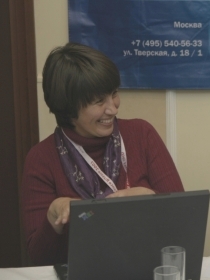Maria Stone about usability. Google.
 At the User Experience conference, I was able to talk to Maria Stone, the head of usability at Google. Talk about usability. Google’s mentioning ends here, so yes, the word “Google” in the title is just for getting attention.
At the User Experience conference, I was able to talk to Maria Stone, the head of usability at Google. Talk about usability. Google’s mentioning ends here, so yes, the word “Google” in the title is just for getting attention.Usability studies, as is well known, were first introduced in aviation and astronautics, where the convenient arrangement of the elements of the control interface often became literally a matter of life and death. But if in the West, the concern for convenience quickly moved into the civilian sphere, where she gave rise to a special discipline within the framework of ergonomics, then we still have not particularly highlighted all the problems associated with this. The pessimism of the “old school” engineers, who are accustomed to rely on their own common sense and flair in the design of the interface, still hinders the adoption of usability research as a normal technological process. Do we need to fight it, can we fight it and can we overcome it? With an attempt to find out the answers to these questions, we will begin.
Is the division of labor useful: the engineer only thinks about functionality, and the usability thinks only about usability?
It depends on the type and maturity of the organization. Ideally, the engineer should know enough about what the usability expert is doing in order to have a healthy respect for his role, and vice versa. There are many different models for promoting and institutionalizing usability within companies. One very successful is the one used, for example, by SAP and Intuit [ business software developers, approx. Tigger ]. They have small usability groups that teach development teams to use usability methods themselves. Communicating with engineers, I rarely encounter an obstinate reluctance to listen to usability tips, if properly communicated and justified. Often, developers are so addicted to this issue that they themselves begin to point out the flaws of usability!
')
 Is it important to pay attention to the culture of usability from the very beginning of product development?
Is it important to pay attention to the culture of usability from the very beginning of product development?Yes, when user research is done in the early stages of design, it makes the job much easier. To begin with, it is very great to make a product that should meet the specific needs of users, and not create technology for the sake of technology. In addition, if you know from the very beginning that you are doing something that people need, it is much easier to imagine how to make money on your product. The technology itself is more difficult to sell. Secondly, the most deplorable situation in which you can find yourself: it is to open the problem with usability just before the launch of the project and realize that in order to eliminate it you need to redo it from the very beginning. One example from my early days in Alta Vista — this search engine had two input fields on the main page: one for searching words and one for searching for stock symbols and other financial information. For users, it was awfully awkward and they were constantly confused with what and where they needed to enter. And there was no hope of changing this situation for the better, without backdating many things that the company was not ready to invest at that time.
Is it possible to create some kind of hard code of usability?
There are many standards and regulations for assessing the usability of interfaces. 10 Nielsen heuristic rules , perhaps the most famous. Apple's Human Interface Guidelines are another famous document. They are useful, but it is even more useful to know why these documents exist. It is very useful to have even a small idea of how a person interacts with information: that we have a very small amount of memory and attention, that we are influenced by habits, etc.
Is the best solution always the majority opinion? Does this opinion play an important role in the development of the product interface?
The best solution should work for most users. However, relying only on the opinions of users, you rarely find the best solution. People are terribly weak in predicting what they will want in the future. And they are also weak in being able to tell you exactly why they like certain things and dislike others. Finally, it is not so easy to accurately collect and analyze user opinions. Therefore, you need experts who know how to ask questions and experts who can observe and interpret human behavior well. The best solution for users should be based on an analysis of their needs and be directed forward, and not be a direct reflection of their opinion at the moment.
Knowing what money the usabilityists get, the question naturally arises: how to become one of them? Where, from what areas of knowledge do such experts come from?
Often from cognitive psychology, anthropology, computer science. Computer engineers who want to work in this field receive master and doctoral degrees in these and related areas. Thus, a usability expert is a smart and, above all, able to watch and observe a psychologist, at the same time speaking the same language with engineers and capable thereby of setting specific tasks for them, the solution of which will lead to the desired goal.
Well, well, finally, we’ll still remember about Google: the Moscow office of the company needs a specialist in user interface design. Are you suitable for this position? Then go ahead, I have put in a good word for you :)
Source: https://habr.com/ru/post/16139/
All Articles